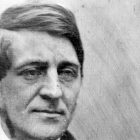The Best Short Story I Read in a Lit Mag This Week: “Rain” by Ben Loory
In her essay, “Fairy Tale is Form, Form is Fairy Tale,” (from The Writer’s Notebook, Tin House Books) Kate Bernheimer discusses how the psychological flatness of characters in tales and fables “allows depth of response in the reader.” In Ben Loory’s “Rain” (Journal of Compressed Creative Arts), we’re given almost no access to the character’s individuality and motivation, creating a character recognizable by virtue of his anonymity.
We first meet the protagonist as he’s in bed, listening, kept awake by the pouring rain. In line with fairy tale tradition, he’s referred to only as “he” or “the man.” He could be anyone, or perhaps better put, everyone. This anonymity serves to draw readers to identify with the character, not because of particulars, but the universal human experience of being anonymous, one of many, and at times, invisible.
In place of going into detail regarding particulars of the protagonist’s individuality—his past, his internal struggle, etc.—Loory instead focuses on the surroundings.
“The man puts his robe on and goes into the living room. He stands there at the window, looking out. He can see the water coming down; it’s slanting in the streetlights. The bushes in the yard are dancing about.”
The robe is any robe, the living room is any living room. The protagonist doesn’t saunter, slouch, or stumble; he goes. The water and the bushes, on the other hand, are given lyrical language and vibrant images, which pop all the more in contrast to the purposefully mundane details of the man and his house.
To this point, we don’t question the character’s motivation. It stands to reason that a person might step outside to watch such a lovely rainstorm. Even when he steps outside and lets the rain splash on his face, we could imagine a time or place or situation where that would be a natural thing to do. But notice how Loory treats the protagonist’s next decisions.
“…He splashes out down the path, toward the gate. His robe falls off as he steps into the street.
He heads for town, water moving past his feet.
By the time the man gets only a few blocks down, the whole street’s become a raging river. It takes all his effort just to stay standing up.
So he lies down, and lets the current take him.”
Why does he not pick up his robe when it falls? Is he naked? Why does he head for town? There are a million possibilities, none of them mentioned. But it’s not that Loory’s uninterested in character motivation. Notice the one cause and effect he does reveal: the effort it takes to stay standing in the current, and the corresponding decision to lie down and let it carry him. There’s hints of the allegorical here, the mythical. The story expands out here. But were it to stop, I could imagine an analysis that might sum it up with the help some platitude like the path of least resistance.
Instead, Loory takes the story into an entirely different direction. The protagonist continues resisting, but discovers it’s fruitless fighting the river. He’s dragged away from town and toward a lake. Here, Loory concludes the story.
“And when the man finally slides into the lake, a voice seems to say, It’s okay. It’s warm and it’s deep, and he sinks right on down into the dark.
And then he dissolves away.”
This is the first we’ve heard of the voice, and Loory keeps it mysterious and formless. As with the protagonist, it’s up to the reader to supply its elusive nature. But that surprise and mystery is offset by the final verb, dissolves. Though it might not make sense logically in terms of cause-and-effect—how could it with so little reference to character motivation?—it reverberates associatively back through the piece all the way to the title. Rain, water, rivers, lakes—they are all so alive under Loory’s fingertips. It feels right that the protagonist become a part of them.
About Author
Ross McMeekin’s stories appear or are forthcoming in journals such as Virginia Quarterly Review, Post Road Magazine, Shenandoah, Redivider, and Tin House (online). He edits the literary journal Spartan. He has received fellowships from both the Jack Straw Cultural Center and Richard Hugo House in Seattle.




